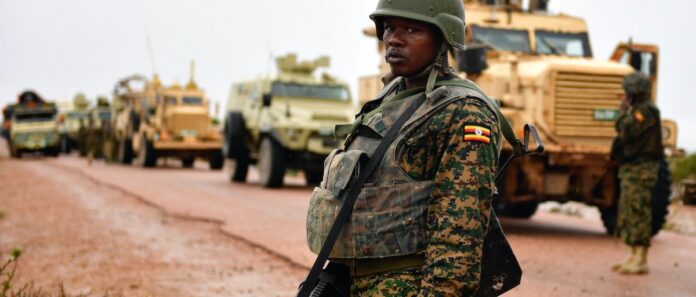MOGADISHU, Somalia – Military chiefs of troop-contributing countries for the African Union Transition Mission in Somalia (Atmis) say they are on course to continue their gradual withdrawal of forces, signaling a handover of security duties to Mogadishu as planned.
After a four-day meeting in Mogadishu, the leaders of troop-contributing countries said on Sunday they will go ahead to pull out 3,000 more soldiers by September.
Yet Somalia, and Kenya, have been receiving a heavier blow of attacks from Al Shabaab.
Atmis had by mid-July handed over six forward operating bases (FOBs) to the Somalia security agencies. This coincided with increased attacks on Kenya with the Governor of the frontier county of Mandera, Mohammed Adan Khalif, admitting that as much as 60 percent of the expansive region is now under the control of Al Shabaab.
Will the draw-down hurt the policing of these regions? Atmis Force Commander, Gen Sam Okiding said in Mogadishu that the peacekeepers have covered a wide range of issues, including security, after evaluating the threats posed by Al Shabaab.
“We’ve enacted the resolutions that you are going to implement in your respective sectors. We have also covered transition in detail from phase one drawdown to the impact after the drawdown as well as our capacity and capability for subsequent operations.,” he said on Sunday.
Kenya, Ethiopia, and Djibouti—three of the five troop-producing countries (Burundi and Uganda are the other two) that are directly affected by the activities of Al Shabaab—have offered to retain a certain number of troops in Somalia even if Atmis entirely withdraws by the end of 2024.
In February this year, the three agreed with Somalia to continue an arrangement meant to smoke shabaabs from every corner of the Horn under a ‘Frontier countries’ agreement.
Governor Khalif expressed concerns during a forum by four countries; Mandera, Wajir; Garissa, and Lamu that have been attacked by Al Shabaab in recent times. The attacks mainly occurred in June when Kenya’s national police force said that some 20 people were killed in Lamu within one week.
In June, Al Shabaab heightened its activities in the Kenyan regions of northeastern and in the coastal region of Lamu, where five civilians were killed, some ‘beheaded’, in the villages of Juhudi and Salama in Lamu County. The attacks came just as Somalia and Kenya entered into an agreement to reopen the border points closed since 2011.
The attack by Al Shabab occurred in villages that border Somalia, an area where the group often carries out raids. The attackers also burnt houses and destroyed property. A number of residents of Juhudi and Salama villages have fled their homes. At least 30 armed men dressed in military uniforms and sarongs stormed the two villages in Lamu County at night.
On June 13, eight Kenyan police officers were killed in Garissa, an eastern county along the border with Somalia, when their vehicle struck an improvised explosive device. On June 24, five civilians had their throats cut in an attack in Lamu, another county on the border. Some were beheaded.
Gen Peter Kimani Muteti, the Atmis Deputy Force Commander in charge of Support and Logistics, said that the peacekeepers have fulfilled their key components of the mandate including degrading Al Shabaab, protecting civilians, ensuring that we are giving access to and escorts to humanitarian assistance, mentoring Somali Security Forces (SSF), and not forgetting issues of supporting stabilisation.
“We must consistently ensure that, whether jointly or individually as Atmis, we continue to deliver the mandate in the manner in which it is provided,” said Gen Muteti. Atmis withdrew 2000 soldiers from Somalia at the end of June and handed over six FOBs to the Somali Security Forces (SSF) in line with the UN Security Council Resolutions 2628, 2670, and 2687.
Gen Okiding says that the four-day meeting discussed the transition in detail, mainly phase one drawdown and its impact as well as our capacity and capabilities for subsequent operations. Experts say that Atmis and Somali forces at remote bases will be more vulnerable to Al Shabaab attacks during the transition.
The EastAfrican






